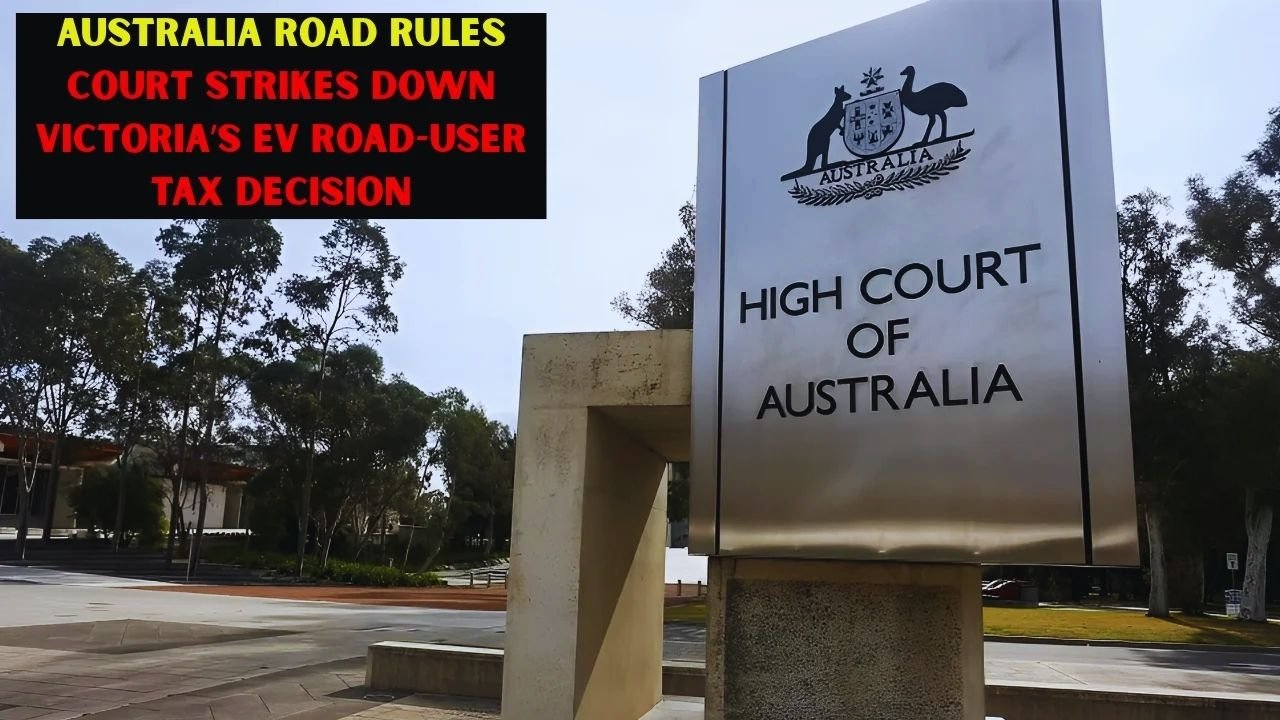The High Court of Australia has ruled Victoria’s electric vehicle (EV) road user tax unconstitutional, marking a major shift in vehicle taxation policy. The landmark decision has significant implications for EV owners, state governments, and Australia’s approach to sustainable transport.
What Was Victoria’s EV Road User Tax?
In July 2021, Victoria introduced a distance-based tax on electric and hydrogen vehicles to compensate for lost fuel excise revenue.
| Vehicle Type | Charge per Km | Status |
|---|---|---|
| Electric/Hydrogen EVs | 2.8 cents | Ruled unconstitutional |
| Plug-in Hybrid EVs | 2.3 cents | Ruled unconstitutional |
The tax applied per kilometre driven and aimed to create equitable road funding across all vehicle types while encouraging sustainable transport. However, EV users challenged its legality.
High Court Ruling: Why the Tax Was Unconstitutional
Two EV owners, Kath Davies and Christopher Vanderstock, contested the tax. The High Court, in a 4-3 decision, ruled that:
- The EV road user tax was effectively an excise duty, which can only be imposed by the Federal Parliament under Section 90 of the Constitution.
- The state’s taxation overstepped constitutional powers, making it invalid.
- The precedent used to justify state levies on EV use was incorrect, emphasizing the need for federal oversight on excise duties.
This ruling not only affects Victoria but also sets a precedent for other states considering similar EV taxes.
Implications for Other States
States like New South Wales and Western Australia, which had considered EV road user charges, may now reconsider or suspend their policies. Key takeaways include:
- National consistency: The ruling highlights the need for cohesive, nationwide policies rather than fragmented state measures.
- EV adoption: Removing state taxes encourages more Australians to switch to cleaner electric vehicles.
- Environmental benefits: Easier access to EVs supports Australia’s long-term decarbonization goals.
Broader Impact on State Tax Powers
The decision has sparked discussions on the constitutional limits of state taxation powers. Potential impacts include:
- Review of vehicle-related taxes and levies
- Examination of duties on goods, gaming machines, and other state-imposed charges
- Calls for coordinated federal and state policy to avoid legal conflicts and revenue gaps
What’s Next for EV Road Use Charges?
Although Victoria’s tax was struck down, future approaches may include:
- Registration-based fees rather than per-kilometre excise
- Federal-led, standardized road user charges
- Policies that balance road funding with environmental goals
Such measures would provide clarity, support EV adoption, and comply with constitutional divisions of power.
FAQs About Victoria’s EV Tax Ruling
Q1: Why was Victoria’s EV tax unconstitutional?
The court ruled it an excise duty, which only the Federal Government can impose.
Q2: Does this affect other states?
Yes, states considering similar EV road taxes may pause or revise their policies.
Q3: Will EV owners now pay nothing for road use?
Other fee structures, like registration charges, may still apply in the future.
Q4: How does this impact EV adoption?
Removing the tax reduces costs for EV owners, encouraging more Australians to switch to electric vehicles.
Q5: What is the broader significance of this decision?
It sets a precedent for state taxation limits, supports clean transport, and calls for unified national policies.
Conclusion
The High Court’s decision to strike down Victoria’s EV road user tax is a win for motorists, the environment, and Australia’s push for sustainable transport. It highlights the need for coordinated federal policies that balance road funding with environmental priorities. For EV owners, this ruling makes clean transport more accessible and affordable, helping drive Australia toward a greener future.




